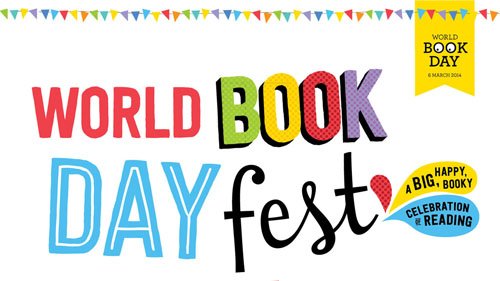It’s finally here! One of our favourite days of the year at Athena Tuition; Thursday 2nd March 2017 is World Book Day (this year marks the 20th anniversary of WBD). The day is celebrated in over 100 countries across the world, and is set aside to celebrate reading, books, and child literacy. It has become a beloved fixture of the school calendar, encouraging children to be passionate about reading and be proud of the books that they treasure.
In schools up and down the UK today, students and teachers alike will be donning costumes and dressing as their favourite literary characters. This is not only good fun, but is also a wonderful way to allow children to align themselves with their favourite fictional characters and be somebody else for the day. For the shy child, World Book Day is their opportunity to become Hermione Granger or Bilbo Baggins, Matilda or Aslan. It’s a day that encourages creativity, confidence and passion.
Not only do children dress up as their favourite fictional friends, but every child at school will be presented with a £1 book token. Working in collaboration with National Book Tokens, World Book Day will distribute over 15 million book tokens today. Children can then take their tokens to their local bookstores and swap it for one of this year’s ten £1 books or get £1 off any book of their choice! Further information about the book tokens and the wonderful selection of books on offer this year can be found here at the World Book Day website. Children who are educated at home don’t need to miss out either; if you get in touch with WBD and send them your address, contact name and the names of the children in your care WBD will ensure that they will receive their book tokens. Following the #WorldBookDay hashtags on Twitter and Instagram will also allow home-schooled children to stay engaged with the excitement of the day and watch all the photographs of this year’s costumes rolling in (perhaps for inspiration for next year)!
Whether your child – or you if you are getting involved too – will be dressing up as an Anne of Green Gables or a Horrid Henry, a Heidi or an Oliver Twist, we really do hope you have a wonderful day celebrating the exciting world of literature. We would love to see your World Book Day 2017 costumes or hear what you’ve been reading to celebrate! Do get in touch with us if you’d like your outfit to be featured on our blog!
Two of our lovely tutors have sent in these special recommendations in honour of book day, and discuss why they think it’s so important for children to engage with literature:
“One of my favourite books- which I come back again and again as an adult- is the Northern Lights by Phillip Pullman. We went on a lovely family holiday to Krakow when I was around 13 years old, which I remember very little of, as I walked around the salt mines with a copy in front of me the whole time.
Bruno Bettleheim (the Austrian child psychoanalyst) used fantasy and fairy tales to introduce children to difficult and challenging concepts, and Pullman does this in the most incredible, engaging way. I’d recommend this to a student who enjoys sweeping and challenging storylines, but also to students who find fantasy unrelatable or difficult to get on board with. Lyra is one of the most believable and real characters in children’s literature and she is an inspirational figure. I love her because in fighting the forces that oppress her she shows such bravery, nobility and strength- an example for everyone in standing up for what is right.
Reading is important for children for the exact reason expressed above- it introduces concepts through narration that allow children to work through the situations presented in the text and arrive at their own conclusions, often on a deeper level than they can yet express in class. This means that they have much more emotional maturity and are able to express themselves much more eloquently in comprehension and creative writing.” Johanna
“I would highly recommend the book, Regeneration, by Pat Barker. It is a fictional adaptation of events that took place in Craiglockhart War Hospital (Scotland) in 1917, a hospital in which famous war poets, Wilfred Owen and Siegfried Sassoon, received treatment for shellshock (what we now know as Post-traumatic Stress Disorder (PTSD). The plot focusses on the treatment of shellshock victims, both real and fictitious, under the care of army psychiatrist, Dr. William H. R. Rivers, including mute Billy Prior, who is only able to communicate by means of pencil and paper. The story also looks at Dr. Rivers’ personal journey and reaction to the then contemporary attitudes to PTSD and methods of treatment, some of which we would consider brutal today.
Dr. Rivers is employed to enable the soldiers under his care to be well enough to fight once more. However, the closer Rivers comes to helping his patients gain some form of psychological rejuvenation, the more tortuous his every decision to send them back to the front becomes. Pat Barker’s Regeneration is the classic exploration of how the traumas of war had devastating effects on a generation of young men, including soldiers, doctors and civilians.
I came across this book at fifteen years of age, and ten years later I believe that anyone aged fourteen and up who hasn’t read it, should. The book has a captivating plot, and those who read it will benefit greatly from pushing themselves to understand the complex emotional experiences that took place a century ago, and continue to occur in those who have been involved in any sort of deep psychological trauma today. In addition, it is worth knowing something about the psychology of the authors behind such poems as, Dulce et decorum est…, Anthem for Doomed Youth, Suicide in the Trenches and Does It Matter?, which becomes clear in this heart-wrenching yet enlightening tale of woe and war.
I defy anyone who reads the novel not to come away with an increased sensitivity and understanding of the survivors and victims of mental illness (which bears much relevance in today’s society), as well as a more enhanced sense of being and interest in English history and culture.” Charity Mapletoft
Image Source: World Book Day website


